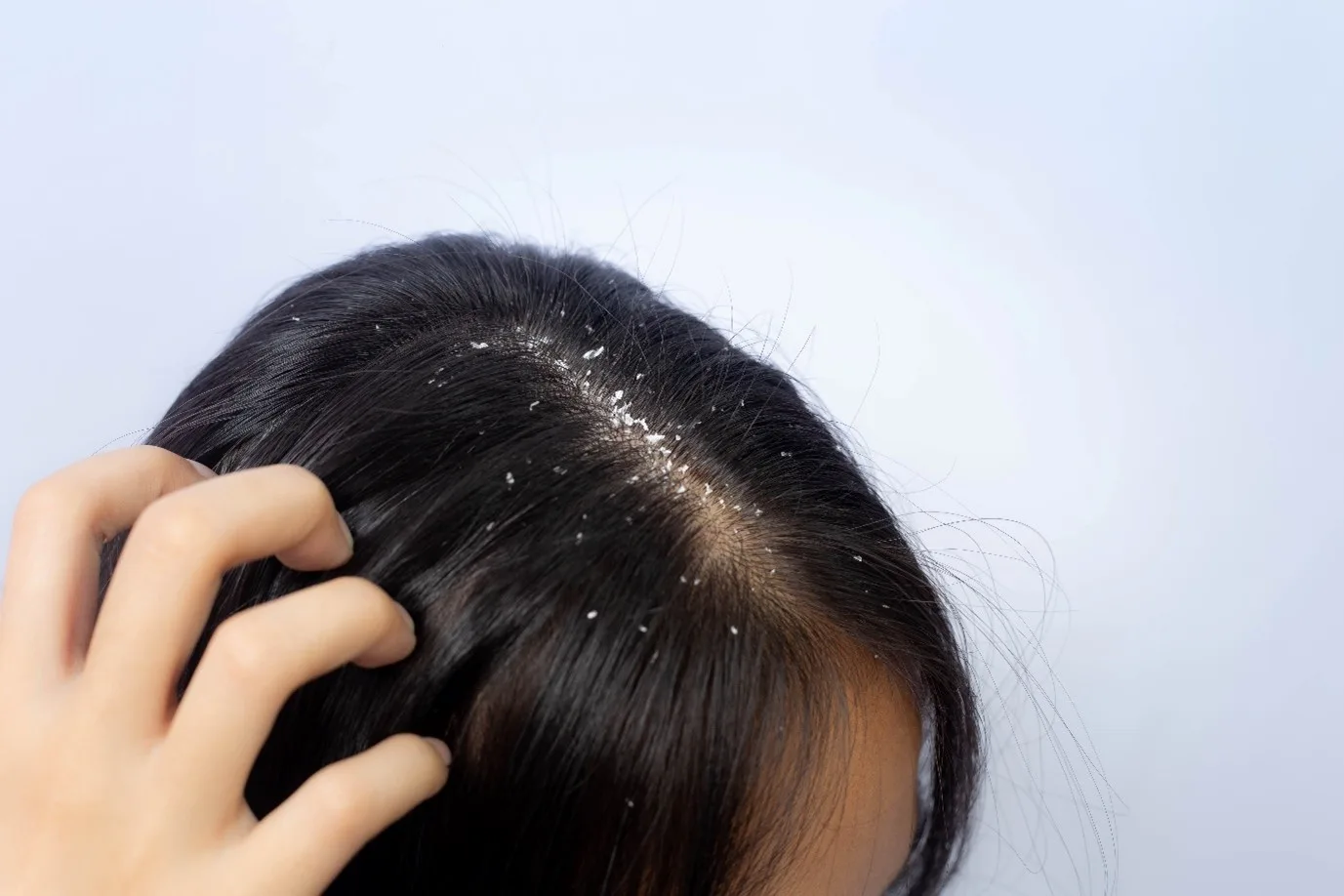Hair Fall Due to Dandruff

Do you find that an outbreak of dandruff on your scalp is accompanied by an increase in hair fall? And can that dandruff cause hair fall?
To give you the simple answer - dandruff does not cause hair fall or hair loss.
If that was all you sought, don’t read any further. But just because it doesn’t cause hair loss doesn’t mean that there is no relation between dandruff and hair loss. This is something that needs to be understood a bit deeper before making a judgement.
What is the cause of dandruff?
Dandruff is a skin infection, usually caused by a fungus called Malassezia Globosa that is found naturally on your scalp. The fungus breaks down the sebum that is secreted by the numerous sebaceous glands and creates oleic acid. Half of the people in the world react to this by-product, ending up with an itchy scalp, red scales, and white-yellow flakes of dead skin cells.
Your sebum production can vary due to a host of reasons like hormonal changes, weather fluctuations, reaction to products, and even stress. So in turn, your dandruff condition can be aggravated by any of these reasons. And with dandruff comes inflammation on your scalp, which is where the connection between dandruff and hairfall crops up.
Hair fall due to dandruff
Research has shown that an irritated scalp can actually damage your hair. When hair grows from a dandruff-affected scalp, it suffers significantly more cuticle and protein damage than hair that grows from a healthy scalp. When talking about dandruff hair loss, we need to look at the factors that accompany dandruff.
- Oil build-up on your scalp can attract dirt and pollutants, which can clog your hair follicles and pores. This disrupts the natural ecosystem of your scalp and hair growth.
- Fungal infections that lead to flaking and scaling of your skin, can weaken your hair roots and cause hair fall.
- Inflammation on your scalp can weaken and thin out your hair strands, which can lead to an increase in hair shedding.
- The inflammation can also cause scarring and damage that prevents new hair from growing out. If this is not rectified, it can become a permanent or semi-permanent hair loss due to dandruff.
- If you have an itchy scalp because of your dandruff, then scratching could further damage the hair, causing split ends and breakage. When you scratch, you injure the hair follicles and the skin, leading to a weaker hold on the hair strand. This is one of the main reasons for hair fall due to dandruff.
It is important to understand that shedding of your hair is normal. The problems arise when you start seeing excessive hair fall. This could be dandruff hair loss or possibly androgenic alopecia which is better known as male/female pattern baldness.
Studies have shown that dandruff can exacerbate alopecia. It was found that over a 2-day period, the hair loss on a non-dandruff scalp was 50-100 strands, while a balding scalp with dandruff saw a hair loss of 100-300 strands. This was primarily due to inflammation, and treatment with anti-dandruff products could possibly limit the progression of this androgenic alopecia. This study proves hair fall due to dandruff, but only on a scalp that is already suffering from alopecia.
What should you do about dandruff and hairfall?
Although dandruff does not directly cause hairfall, we do witness some association between the two. And there are certain things that you can do to help reduce your dandruff and any possible hair loss.
- Shampoo regularly and maintain good hair hygiene. Some people wrongly think that washing your hair leads to hair loss. It is important to use hair and scalp shampoos, 2-3 times a week, so as to keep your scalp clean of any build-up. Use the Head and Shoulders Cool Menthol or Neem to get rid of any dandruff causing germs. You can also use Head and Shoulders 2 in 1 Smooth and Silky shampoo + conditioner for soft and untangled hair on a dandruff free scalp.
- Reduce your stress levels as they can release hormones that spike your oil production and lead to dandruff. Some other hormones can also cause thinning of your hair, but those are tougher to control.
- Eat healthier with a good mix of omega 3, zinc, vitamins B12 + E, proteins and zinc. What you consume can directly affect your hair growth, especially vitamin B12.
- Avoid harsh chemical products, heat styling and tight hairstyles. Give your hair and scalp a break from this constant damage, as these can contribute to weakened hair.
- Massaging Argan oil restores the moisture levels of your hair and scalp, while creating a protective layer around it. This also contains anti-inflammatory properties that help with any itchiness. The act of massaging can increase blood circulation to your scalp and bring nutrients to the hair.
- Be careful with the medication that you use, as reactions can cause both dandruff and hairfall. Certain hair loss drugs can dry out your scalp and triggers your body into producing more oil, which is fodder for dandruff.
- Use Aloe vera to soothe your itchy scalp and get rid of any build-up. This is a great solution on how to get rid of dandruff and can strengthen your hair strand with its moisturising properties.
Dandruff hair loss is usually temporary and once you’ve taken care of the underlying dandruff problem, you shouldn’t have any issues. If it still doesn’t work, then you should consult a doctor for further clarity. But for most of your worries you can use shampoos like the Head and Shoulders Anti-Hairfall, that rescues your hair from damage and leaves you with dandruff free hair. Dandruff and hairfall shouldn’t be a worry for you. But if it is, know that we’ve got you covered.



